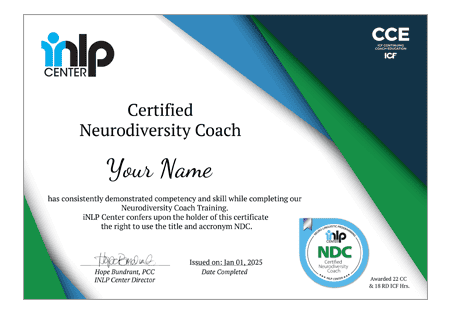This 40-hour ICF accredited course empowers coaches to excel in working with neurodivergent clients. Explore diverse neurotypes such as ADHD, ASD, dyslexia, within an ethical framework. Our ADHD Coach training curriculum blends engaging theory, impactful research, and hands-on application through interactive exercises and real-world case studies. Gain a deep understanding of the social model of disability, explore the challenges of masking and energy management, and develop essential tools and resources. This program equips you with the knowledge and confidence to effectively support neurodivergent individuals while expanding your coaching practice and building valuable professional networks.
Course Structure:
- This 100% online, 40-hour training combines 20 hours of self-paced learning with 20 hours of engaging live sessions conducted via Zoom.
- The curriculum seamlessly integrates theory, research, and practical application.
- Research assignments encourage you to explore relevant sources and gather valuable information.
- Application exercises prepare you to effectively coach neurodivergent clients.
- As you progress, you’ll build a personalized toolkit. Choose to specialize in one neurodivergent type or explore the unique characteristics of various types.
- Live sessions provide an interactive platform to ask questions, present your research findings, and engage in insightful discussions about coaching applications.
- Awards 40 ICF Credit Hours (22 Core Competency, 18 Resource Development)
According to Deloitte, between 10% and 20% of the world’s population is neurodivergent. Imagine a coaching experience truly understood by your clients. As a neurodivergent coach, you bring a unique perspective and empathy that resonates deeply. Your lived experience provides invaluable insights into the challenges faced by neurodivergent individuals, fostering a safe and affirming space where they can openly explore their strengths and weaknesses. Learn how to empower them to develop self-awareness and cultivate strategies for navigating a world often designed for neurotypical minds. By fostering self-acceptance and helping them leverage their unique strengths, you become a catalyst for their success, contributing to a more inclusive and equitable society.
Neurodiversity / ADHD Coach Training – Modules and Content:
Module 1: Introduction to Neurodiversity
This module introduces neurodiversity, covering various neurotypes like ADHD, autism, dyslexia, and giftedness. It explores the strengths and challenges associated with each, emphasizing that these are different ways of thinking and processing information. The module also introduces the social model of disability, highlighting how societal barriers, rather than individual limitations, often create challenges for neurodivergent individuals. This understanding empowers coaches to create inclusive environments and support clients in navigating their unique neurocognitive styles.
Click for Module 1 breakdown
| Module 1 | Introduction to Neurodiversity | |
|---|---|---|
| Unit 1 | Course Information | |
| Unit 2 | ICF Core Competencies and Coaching Neurodivergent Clients | |
| Unit 3 | Introduction to Neurodiversity - Understanding Diverse Brains | |
| Unit 4 | Comparison of Main Neurotypes | |
| Unit 5 | The Social Model of Disability | |
| Unit 6 | Module 1: Research Assignment | |
| Unit 7 | Assignment: Neurodiversity Up Close - Exploring Perspectives and Building Connections | |
| Unit 8 | Assignment: Exploring Neurodiversity and Understanding Different Neurotypes through Interactive Activities |
Module 2: Communication and Coaching for Neurodiversity
This module emphasizes effective communication and trust-building with neurodivergent clients. It covers diverse communication styles, including those of individuals with ADHD, ASD, and dyslexia. Key active listening techniques are discussed, such as mirroring, chunking, and checking for understanding. The importance of adapting coaching questions and creating a sensory-friendly environment is highlighted. Building rapport requires empathy, patience, and a focus on client strengths. By understanding these factors, coaches can establish a strong foundation for successful and supportive relationships with neurodivergent clients.
Click for Module 2 breakdown
| Module 2 | Communication and Coaching for Neurodiversity | |
|---|---|---|
| Unit 1 | Communication and Coaching for Neurodiversity | |
| Unit 2 | Sensory Processing Issues in Neurodiversity | |
| Unit 3 | Module 2: Research Assignment | |
| Unit 4 | Assignment: Decoding Communication - Strategies for Coaching Neurodiverse Clients |
Module 3: Coaching Strategies for Specific Neurotypes
This module focuses on coaching strategies for neurodivergent individuals, including those with ADHD, ASD, and Dyslexia. It covers essential areas like time management, focus, organization, social skills, emotional regulation, sensory processing, and learning strategies. Key techniques include breaking down tasks, using visual aids, mindfulness practices, and exploring alternative learning methods. The importance of addressing executive function challenges through collaborative goal setting and progress tracking is also emphasized.
Click for Module 3 breakdown
| Module 3 | Coaching Strategies for Specific Neurotypes | |
|---|---|---|
| Unit 1 | Coaching Strategies for Specific Neurotypes | |
| Unit 2 | To Adapt vs. To Learn | |
| Unit 3 | Learning Applications and Tools for Neurodivergent Individuals | |
| Unit 4 | Assignment: The Energy Balancing Act - Exploring Masking in Neurodiversity |
Module 4: Ethics and Professionalism in Neurodiversity Coaching
This section emphasizes the ethical considerations and professional conduct guidelines for coaches working with neurodivergent clients. Key aspects include acknowledging limitations, obtaining informed consent, maintaining confidentiality, respecting client autonomy, and avoiding bias. It also highlights the importance of supporting client self-advocacy, collaborating with mental health professionals when necessary, and engaging in ongoing learning to enhance coaching effectiveness and provide ethical support for neurodivergent individuals.
Click for Module 4 breakdown
| Module 4 | Ethics and Professionalism in Neurodiversity Coaching | |
|---|---|---|
| Unit 1 | Ethics and Professionalism in Neurodiversity Coaching | |
| Unit 2 | ICF Competencies and Ethical Guidelines for Coaching Neurodivergent Clients | |
| Unit 3 | Assignment: Expanding Your Network - Building Connections in Neurodiversity Coaching and Testing | |
| Unit 4 | Exploring Neurodiversity Testing | |
| Unit 5 | Assignment: Start Building a Network |
Module 5: Wrap-Up and Next Steps
This concluding module synthesizes your learning journey in our neurodiversity and ADHD coach training . Building upon a foundation of understanding diverse neurotypes (ADHD, ASD, Dyslexia) and their unique strengths and challenges, you’ve explored effective communication strategies, tailored coaching techniques, and ethical considerations. Now, you’ll consolidate these learnings, plan for your future as a neurodiversity-informed coach, and take action to integrate this knowledge into your practice.
Click for Module 5 breakdown
| Module 5 | Wrap-Up and Next Steps | |
|---|---|---|
| Unit 1 | Wrap-Up and Next Steps | |
| Unit 2 | Assignment: Coaching for Neurodiversity: Client-Centered Toolkit |
Additional Course Elements:
- Interactive activities, case studies, and role-playing exercises are included throughout the course
- Participants are encouraged to explore their own biases and assumptions about neurodiversity
- Participants will build a list of relevant resources and a solid toolkit
- Participants are invited to stay informed about ongoing research and debates on the topic
- The course is challenging because it can involve understanding another way of processing information and seeing the world
- Students are encouraged to use live sessions to process the information and look for outside support.
Neurodiversity Coach Training Enrollment Options
| Coach Training Program: | Program Includes: | One-time Price | Installment Plan |
|---|---|---|---|
| Neurodiversity Coach Certification Track – ICF Level 2 5 Certifications | • NLP-Integrated Master Coach Track (ICF Level 2) • Neurodiversity Coach Training (40 ICF CCE’s) • Business & Marketing Guide • ICF Mentor Coaching | $7400 Enroll Now | $775/mo. for 10 months Enroll Now |
| Neurodiversity Coach Certification Track – ICF Level 1 4 Certifications | • NLP-Integrated Life Coach Training (ICF Level 1) • Neurodiversity Coach Training (40 ICF CCE’s) • Business & Marketing Guide • ICF Mentor Coaching | $5600 Enroll Now | $653/mo. for 9 months Enroll Now |
| Neurodiversity Coach Certification Condensed Track 3 Certifications | • NLP Combo Training (24 CCE’s) • Neurodiversity Coach Training (40 ICF CCE’s) See Prerequisites below* | $2800 Enroll Now | $592/mo. for 5 months Enroll Now |
| Neurodiversity Coach Training Add-on 1 Certification | • Neurodiversity Coach Training Only (40 ICF CCE’s) See Prerequisites below** | $2000 Enroll Now | – |
* To enroll in our Condensed Track option, you must be an ICF ACC credentialed coach. ** To enroll in our Neurodiversity Coach Certification Training alone, you must have completed or are enrolled in our NLP-Integrated Life Coach Certification. If you are not enrolled in this course, please choose one of our Neurodiversity Coach Training Tracks above.
Neurodiversity Coach Training FAQ’s
This program is designed to equip coaches with the skills and knowledge to effectively support neurodivergent clients, including those with ADHD, ASD (Autism Spectrum Disorder), and dyslexia.
The training covers understanding various neurotypes, their unique strengths, and the challenges they may face.
Yes, it focuses on effective communication and trust-building techniques, adapting coaching questions, and creating a sensory-friendly environment suitable for neurodivergent individuals.
Yes, the program includes coaching strategies tailored for specific neurotypes, focusing on areas like time management, organization, social skills, and emotional regulation.
Yes, ethical considerations and professional conduct in neurodiversity coaching, including client autonomy and confidentiality, are covered.
The program includes self-paced learning through reading, listening, and interactive activities, case studies, and weekly live sessions to enhance learning.
This training is ideal for coaches who wish to specialize in supporting neurodivergent clients or add essential tools for working with their neurodivergent clients within their current niche.
Yes, the course explicitly mentions focusing on supporting clients with ADHD, ASD, dyslexia, as well as gifted.
Yes, a key aspect of the training is building trust and effective communication with neurodivergent clients.
Read this article to learn what a neurodiversity coach does.
Yes, the program offers various enrollment options, including tracks that combine neurodiversity coach training with other coaching certifications.
The job outlook for neurodiversity coaches appears to be positive and growing. The demand is strong and driven by several key factors across different sectors:
• Increased Awareness: Awareness and acceptance of neurodiversity (including ADHD, autism, dyslexia, etc.) are rising significantly, leading to a greater recognition of the need for specialized support. It’s estimated that 15-20% of the global population is neurodivergent.
• Workplace Inclusion: Companies are increasingly focused on Diversity, Equity, and Inclusion (DE&I) initiatives that include neurodiversity. They recognize the competitive advantage and unique strengths (like creativity, pattern recognition, and attention to detail) that neurodivergent employees bring. This drives demand for coaches who can support neurodivergent employees and train managers on creating neuro-inclusive environments.
• Education Sector: There is a growing need for neurodiversity coaching in educational settings, from K-12 to universities, to help students with executive functioning, self-advocacy, and navigating academic challenges.
• Untapped Talent Pool: High rates of unemployment and underemployment among neurodivergent adults, particularly those with autism, mean there’s a significant need for coaches to help clients overcome barriers in the hiring process, develop soft skills, and thrive in their careers.
Neurodiversity coaches can find work in a variety of settings:
• Corporate/Consulting: Working directly with companies on DE&I initiatives, employee coaching, and manager training.
Independent Practice: Starting a private coaching business focused on career, life, or executive coaching for neurodivergent adults, students, and families.
• Educational Institutions: Partnering with colleges and universities to provide student support services.
• Specialized Organizations: Working for non-profits or companies that focus specifically on neurodivergent employment and support (often called “Job Coaching”).








